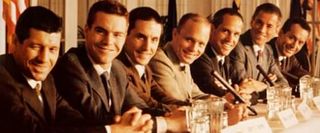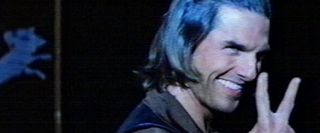
Earlier today we brought you our list of 7 movies that prove shorter is better-- that is, seven of our favorite films that spend 90 minutes or less telling you a memorable story without wasting a single moment. It's based on an oft-stated theory that the perfect length for a movie is 90 minutes, and that anything longer than that is just wasting your time.
But that's a rule, like all the others, that's meant to be broken. Anyone who has ever sat captivated in a theater knows that there are some movies that could go on for an entire day and never get boring, earning their running time with complicated stories, well-drawn characters, or just damn good filmmaking. So in the interest of presenting the other side of the coin, here are 7 more movies, these the ones that prove you can go on as long as you like-- two, three, even four hours-- and still not be wasting a single minute. There are countless more examples than the ones we've selected below, but take a look at our personal favorite long movies, and chime in with your own in the comments.

Pulp Fiction (156 minutes)
by Mack Rawden
Pulp Fiction should suck. It’s a two hour and thirty-six minute genre mixing, fast talking piece of pretension told through seven nonlinear vignettes without a traditional score featuring John Travolta and Bruce Willis immediately following the low points of their careers. Its director, with no acting experience, cast himself in a pivotal role with a lot of fast-talking dialogue. Everything about that description sounds miserable, but there’s something about Pulp Fiction’s first scene that’s hard to turn away from. Guns are impulsively pulled, threats are issued and the opening credits roll blaring Dick Dale’s take on “Misirlou”. On and on the story rumbles, stopping off for heroin, milkshakes, gold watches and wallets. There’s no time to question because Quentin Tarantino doesn’t afford the viewer that luxury. It’s all pace all the time, and when it’s done two hours and thirty-six minutes later, it feels like time well spent.

The Right Stuff (193 minutes)
by Jesse Carp
CINEMABLEND NEWSLETTER
Your Daily Blend of Entertainment News
It takes a lot for an audience to invest over three hours in a movie, especially one severely lacking in godfathers, deer hunters and/or hobbits. The Right Stuff, a sprawling adaptation of Tom Wolfe's seminal non-fiction exploration of the birth of the space program, is absolutely fascinating for each and every one of the 193 minutes it takes to tell the tale. The film spans fifteen years, from Chuck Yeager breaking the sound barrier to the Mercury 7 astronauts being selected, trained and sent into space. It's the extended time we get to spend with the pilots turned astronauts (and their families) as well as the attention to detail that makes it deserving of the ungodly running time. The exceptionally acted characters, moments of great tension and humor as well as a fascinating true story make it a forgotten gem of the early 1980s, a truly wonderful and expansive film that should resonate even more now that the US Space Program is all but kaput.

Magnolia (188 minutes)
by Kelly West
Magnolia is a series of stories, tied together by the strange and seemingly coincidental connections of the characters that take much longer than your typical drama to play out. Director P.T. Anderson always excels at building momentum in his films, and here he takes us through some exceptionally emotional scenes, including watching a woman struggle with agonizing regret as she anticipates her husband’s death, a child attempting to meet the expectations of his father, a motivational speaker trying to deny his past, and a big-hearted cop looking for respect and love. As the film goes on, the stories begin to touch sides and in some cases overlap, delivering numerous satisfying conclusions. Anderson creates a current in the film that carries you along through this film's sea of people trapped by anger, frustration and regret; the final shower of frogs feels like more than a fair payoff for the time invested.

Apocalypse Now (153 minutes)
by Katey Rich
Colonel Kurtz spent years losing his mind deep in the jungle; we only get 153 minutes (depending on which version you watch), but the intensity and deliberate pace of Apocalypse Now means that's more than enough. Francis Ford Coppola takes the simple story of a boat traveling into the Vietnam jungle and stretches it out long and tense like a guitar string, humming and ready to break. By the time you meet Marlon Brando's Colonel Kurtz, you've felt the mosquitoes and the oppressive heat for nearly two hours; you're locked in with him. The massive running time, extended to 200 minutes in the Redux version, also allows for some of history's best supporting actor turns, from Robert "Charlie Don't Surf" Duvall to Dennis "He Was A Kind Man?" Hopper. But mostly the time just lets the jungle seep into your skin and drive you crazy; it's a long movie, but it's a hell of a lot shorter than your own tour of Vietnam.

The Dark Knight (152 minutes)
by Eric Eisenberg
As a complete and total comic book geek, I could watch a well-made Batman movie for seven hours, but there’s truly something special about The Dark Knight that makes its 152 minute runtime perfect. More than just a comic book movie, it’s a crime film with a beautifully twisted plot that just happens to feature a costumed hero. There isn’t an ounce of fat anywhere to be seen, every moment either adding to the conflict between Batman and The Joker, the relationship between Bruce Wayne and Rachel Dawes or building up Harvey Dent only to make his fall all the more tragic. The pacing is perfect, the story nor character development ever coming along too quickly or slowly and not a single scene overstays its welcome or is cut too soon. The Dark Knight earns every minute.

Titanic (194 minutes)
by Sean O'Connell
Before James Cameron and his massive ego took to the stage at the Academy Awards and declared that he was “the king of the world,” there was a boy, a girl, and a boat. Cameron’s throwback to old-school, movie-making magic captivated audiences of all ages. Haters say that at 194 minutes, Cameron’s film is excessive, repetitive and overlong. I’d argue that you need every single moment on screen to get to know Jack (Leonardo DiCaprio), Rose (Kate Winslet), and the director’s spectacular boat so that you’ll give a damn when he painstakingly destroys it in his movie’s second half. Titanic almost feels like two stories in one, a romance and a tragedy bookended by a modern-day narration that gracefully weaves Cameron’s narration into one cohesive package. By refusing to compromise in the face of escalating budgets and studio scrutiny, Cameron ensured that his film’s legacy, like Celine Dion’s heart, will go on and on.

Return of the King (201 minutes)
by Josh Tyler
An epic can’t, by the very nature of being an epic, clock in at under 90 minutes. Yet Return of the King took that concept even further by stretching its running time over and over, with a never ending string of goodbyes added on to what even without them would have been one of the longest movies of the past decade. In most films, even in an epic, that kind of added clock stopping would be unacceptable, but not in Return of the King. You see, by then the movie had earned it. After fighting alongside Frodo and his friends through dangers untold, on one of the longest walks in movie history, after struggle and death and sacrifice, Lord of the Rings left everything it had to give up there on the screen. A journey like this one needs a substantial reward, and both for Frodo and his audience, that extra running time was it. Through blood, sweat, and tears… the movie earned it. We earned it.
Most Popular





